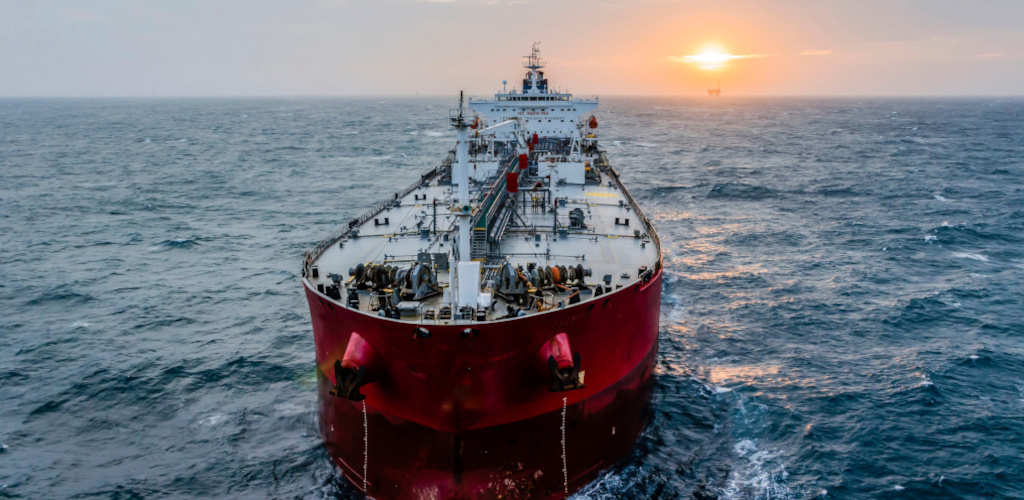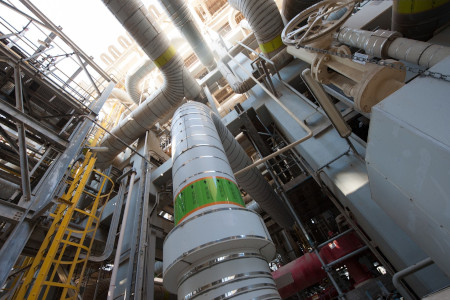Sep 05 | 2023
LNG Expansion to Provide Steady Flow of Work

By Jeremy Bowden
In a feature story from Issue 5 of Breakbulk Magazine, we turn our attention to Qatar, the Middle East nation calling for substantial breakbulk support for a two-phase expansion of its North Field liquefied natural gas, or LNG venture – the largest of its kind in the world.
Qatar has embarked on the world’s largest liquefied natural gas, or LNG, export capacity expansion, with demand for the fuel expected to keep rising for the next twenty years at least, despite growing evidence of man-made global warming. The extensive infrastructure required will mostly be shipped into the region, providing steady business for project cargo movers in the Middle East and beyond.
The State of Qatar is a small country that sits in the Middle East Gulf astride the world’s biggest gas field, known as North Field in Qatar, and South Pars in Iran, into whose waters it stretches. The field is about ten times the size of the next biggest conventional gas fields (located in northern Russia), and exports of LNG and associated liquids from North Field have already made Qataris among the richest people in the world on a per capita basis.
Up to 2012, Qatar built 77 million tons per year (mt/yr) of export capacity – among the largest in the world, alongside Australia and more recently the U.S. After a moratorium in 2005 on new capacity for several years, imposed to evaluate the impact of growing output on the field structure, state-owned Qatar Energy announced the North Field East, or NFE, expansion project in April 2017.
When completed, the NFE Project will increase the State of Qatar’s LNG production capacity by 33mt/yr or 43 percent to 110mt/ yr. First LNG production from the US$28.75bn NFE expansion, which involves four giant new LNG trains, is expected to start in 2025.
The second phase of the LNG expansion, known as the North Field South, or NFS Project, will further increase Qatar’s LNG production capacity from 110mt/yr to 126mt/yr by 2027 – 63 percent above current levels. This is expected to make Qatar (with a population of just 2.7 million, of which only 15 percent are Arab nationals), the world’s biggest LNG exporter once again, depending on developments in the U.S.
The huge two-phase project is the world’s largest ever LNG expansion and is being done in a region that imports most of its equipment needs over long distances by sea. This means there are massive opportunities for breakbulk providers to move the heavy equipment and infrastructure into place from suppliers around the world.
Only a relatively small proportion originates in Qatar, and most comes from outside the Middle East, from east Asia, Europe and the Americas. “Most of the general cargo originates from various global locations, including China, Japan, South Korea, Indonesia, the UK, Brazil and Argentina, arriving via vessels by sea. Also, some time-critical spare parts arrive by air,” Suren Motha, business manager for shipping services at GAC Qatar, told Breakbulk.
“These international origins underscore the breadth of the logistical endeavor, involving coordination with multiple stakeholders, suppliers, and partners from around the world,” she said, making seamless coordination with the port, vessel and receivers, essential.
Oil Company and EPC Partners
State-owned QatarGas and QatarEnergy, which are running the show, have a range of major western oil company partners. In June 2022, TotalEnergies agreed to a US$2 billion joint venture deal to take part in the project – encouraged by its need to find replacements for substantial lost LNG assets in Russia.
Qatar Energy also formed JVs last year with Eni, ExxonMobil, Shell and ConocoPhillips. Qatar Energy holds 75 percent interest in each JV, while TotalEnergies, ExxonMobil, and Shell own 25 percent interest in their respective JVs, and Eni and ConocoPhillips hold 12.5 percent interest each.
These companies, along with the Qatari state giants, are involved in lining up contractors for the projects, including breakbulk and heavy-lift logistics providers. Also key are the main engineering procurement and construction, or EPC, contractors.
 The first major EPC contract, for the NFE project, was awarded in February 2021 by Qatar Petroleum to a Chiyoda-Technip JV, and covered the bulk of works associated with the construction of the project’s four LNG mega-trains and associated facilities.
The first major EPC contract, for the NFE project, was awarded in February 2021 by Qatar Petroleum to a Chiyoda-Technip JV, and covered the bulk of works associated with the construction of the project’s four LNG mega-trains and associated facilities.Qatar Petroleum also awarded a second major NFE project EPC to Samsung C&T Corporation for the expansion of the LNG storage and loading facilities located within Ras Laffan Industrial City in Qatar. This second contract, valued at more than US$2 billion, was awarded on a lump sum basis. Both contracts represent the culmination of front-end engineering and design work that began in early 2018.
On the liquids side (mostly natural gas liquids and condensate produced alongside gas from the North Field), Qatar Petroleum awarded Spain’s Técnicas Reunidas the EPC contract for the North Field LNG expansion in late 2021, valued at more than US$500m.
This makes Técnicas Reunidas responsible for the expansion of existing liquid products storage and loading facilities, including processed propane and butane. The contract also includes expansion of import facilities for mono-ethylene glycol within Ras Laffan Industrial City and other ancillary facilities and pipelines associated with the expansion project.
Then in mid-May this year, Qatar Energy awarded the main US$10 billion EPC contract for work on the phase 2 NFS expansion project to a grouping of Technip Energies and Middle East-based Consolidated Contractors Company. This deal covers work on the NFS project’s two 8mt/yr LNG mega trains, “with associated facilities for gas treatment, natural gas liquids recovery, as well as helium extraction and refining within Ras Laffan Industrial City,” according to Qatar Energy.
The U.S. Trade Administration in Qatar said online that Qatar Energy’s focus on major contracts for the North Field Expansion, “together with the upcoming development of the petrochemical complex and ethane cracker facility, are likely to be key drivers of business activities in the region’s energy sector.”
550-plus Kilometers of Pipes
One major area of work associated with the projects is gas pipeline transportation and installation. GAC Qatar’s Motha said that those involved were “actively importing pipes and project cargo” for the expansion projects. She said one major gas company was anticipating the need for 4-5 vessels per month over the next year to fulfil the requirement of over 550 kilometers of underwater pipe laying.
“These projects entail substantial breakbulk and heavy-lift demands to ensure the successful transportation and installation of crucial components… GAC plays a pivotal role as the vessel agents, offering comprehensive services such as customs clearance, land transportation, open yard storage, management, and loadout onto barges. Our involvement extends across various aspects of the logistical process, ensuring a seamless flow of operations for the Qatari LNG projects.”
GAC said the heaviest cargo it handled associated with the LNG expansion projects weighed up to 230 tons. “Additionally, the range of pipe sizes, spanning from 6 to 28 and 32 feet, further adds to the challenge of the logistical process. These unique dimensions and weights indeed pose challenges for breakbulk providers, necessitating specialized equipment, careful planning, execution, and expertise in handling unconventional movements.”
The LNG project expansions and sheer size of the Qatari LNG and energy sector generally has supported growth of the logistics market in Qatar. Only last December, GAC Qatar opened a new 27,000 m2 multi-user contract logistics facility and office building in Ras Bufontas Free Zone, designed to help boost customer options (built in partnership with Qatar Free Zones Authority.
Growth of 3PLs
Looking ahead, Mordor Intelligence said the LNG expansion plans, alongside growth in the eCommerce sector, were expected to expand the third-party logistics, or 3PL, market further over the next five years. “Qatar tops all GCC countries for domestic logistics and is the 7th most competitive of the world’s leading emerging markets, a performance driven by its strong business conditions and digital readiness,” Mordor said.
It added that the 3PL market in Qatar was “fairly fragmented with very few local and many international players active. Some of the major players include BDP International Qatar WLL, Aramex, Falcon Express (FedEx), Links Shipping, and Cargo World.”
Qatar is attractive to logistics providers due to its strategic location, world-class infrastructure, government backing and experienced workforce, according to Mordor. “Therefore, many businesses are partnering with transport and logistics companies in Qatar.”
One example is between GWC of Qatar and Ponticelli Frères Group, where GWC will handle the freight forwarding, customs brokerage, and transport for Ponticelli in Qatar for three years. The deal should smooth and speed deliveries within the State of Qatar for Ponticelli, which is focused on the oil and gas, energy, chemical, pharmaceutical, and steelworks sectors.
Altogether, the expansion projects should provide a steady flow of opportunities for 3PLs, shippers and others involved in the global and regional breakbulk and heavy-lift sector for several years to come. But once complete at the end of 2027, activity is likely to quickly subside, with little further development of the field expected, as the wealthy country attempts to focus on diversifying away from hydrocarbons.
Breakbulk Middle East 2024 is taking place on 12-13 February at the Dubai World Trade Center.
TOP PHOTO: GAC LNG-LPG transport vessel. CREDIT: GAC
INSERT: Qatargas LNG installation, Qatar. CREDIT: Qatargas
